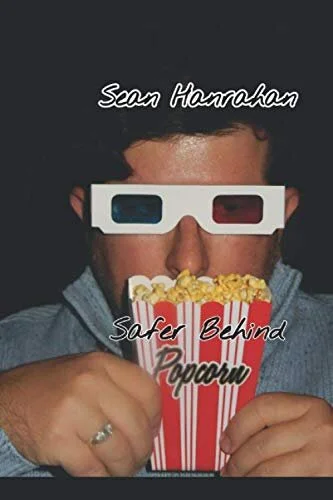“He has taken us on a journey of discovery, and we are better people for it.”
“Mememto mori,” the reminder that we all will die, traces its history to Socrates. In Plato’s Phaedo, Socrates says, “The one aim of those who practice philosophy in the proper manner is to practice for dying and death.” In this sense, Philip Dykhouse is a philosopher for our time.
In Dykhouse’s inaugural chapbook Bury Me Here, the poet explores physical death as well as emotional death and loss. Rather than being morbid about it, however, Dykhouse is probing and honest.
Dykhouse wants us to think about dying, about the death of hope, about the despair that comes with a series of accumulated losses. Even though the poet is barely scratching 40, he posits like a man who has seen his fair share of adversity and one who takes life’s challenges seriously.
The poet’s writing style is spare and tough, with a rhythm and musicality that could fit in the repertoire of many rock musicians. While one gains an overall sense of contemplation and/or tragic forebodings when reading his work, each poem carries its own puzzle, sometimes concealed behind clever word play or unique metaphors.
“The Last Song on the Album,” for example, talks about “tear ducts” being a “delta feeding my most rapid / eulogies of all I tried to say.” When the poet complains about not having enough time to reconcile with the idea of death, he writes: “the credits always seem to be rolling.”
In this poem, the last in the collection of 20, Dykhouse lets loose an existential cry that seems to have been building since the first page. The poet appears to be at a funeral in a cemetery. He wants to feel an emotional heft that’s just not there.
Please cut off my index
fingers, but only after I’ve
written a few letters goodbye.
The finality of death is terrifying, but our treatment of it has become standard and clichéd. Death is an inconvenience, which is why “burials often take place / early in the morning.” And we’re good with all the physical accouterments — traffic stickers and after-funeral parties. But are we equipped to deal with death from the inside out? That is the question Dykhouse poses here and ends this poem with a plea to the universe:
Can anyone please tell us when it starts?
Can anyone please tell me when it ends?
The order of the poems in Bury Me Here seems to suggest distinct periods in the poet’s life. First, reminiscing about his childhood: “I haven’t prayed for anything / since I played centerfield twenty years ago.” Then a few poems about a reckless youth, perhaps involving too much alcohol. “There is nothing left to my / glass but the rocks, and / they crash against my lips…” (with a nod to Homer’s Odyssey).
By the time we get to the seventh poem, “Iceman of Philadelphia,” we sense the poet has begun to reclaim his life.
Broken hearts were
once a concern of mine.
That is until man’s folly
carved a hole in my chest.
In this poem as in others, Dykhouse works his metaphorical magic, especially when he claims: “I’m a lionhearted loser / on a lone wolf leash.”
This poem, and the next one, “Surfaces,” where Dykhouse advises the reader to “Pull my veins out; / coil them from your / wrist to your elbow,” reminded me of Charles Bukowski. And it’s no wonder as Dykhouse told me in a phone interview that Bukowski is one of his favorite poets.
“Not only did Bukowski have a dark view of the world, but he had the balls to say it. And he said it in as few words as possible,” Dykhouse told me.
Once the poet has reclaimed his life, he branches out into the world. “Poison in the Pit” creates a dystopian landscape distinguished by class differences, and a group of people in a pit relying on scraps to eat.
In “Among the Dead,” Dykhouse seems to chronicle the loss of faith. “You must go now, Father. / They’re tearing down the church.”
And then we arrive at “No Vacancy No Vacancy,” a poem where Dykhouse thoroughly bares his soul. The poet uses the device of presenting two parallel poems: one with stanzas in normal type, the other with alternating stanzas in italics (hence, the italics in the title). The commonality of both poems is that the events have left an indelible mark on the poet’s psyche.
In one half of the poem, Dykhouse, perhaps in his late teens, recounts the death of his father, who was not healthy, in more ways than one:
He rented a small, single room
at a motel that a friend of his owned.
That’s where he lived, alone.
The other half of the poem details a prank that friends pulled on the poet as a young boy.
I soon saw what they had
brought me there for.
They had dug a hole—
a hole deep enough that if a boy
were to fall in, he would
need someone to help him out.
The boys did indeed push the young Dykhouse into the pit from which he could not escape without their help.
Dykhouse has prepared us for this emotional journey by carefully crafting succinct poems loaded with vivid imagery and twisting metaphors — “It’s a wasteland in these / dictionary days, endlessly / competing with the meanings” — that convey the yearnings of a curious mind to find answers to questions that may be unanswerable.
The remaining few poems in the collection express an air of emotional maturity perhaps missing in previous poems. To paraphrase Joseph Campbell, the poet has gone into the dark forest for an extended period of time and has emerged a new man. In the poem “A Western World in an Eastern Universe,” he states:
There should be a shift in my thinking,
a monumental movement towards
an easiness generally found on the
porches of somewhere else.
We have come full circle with Dykhouse. He has taken us on a journey of discovery, and we are better people for it. My only suggestion to this maturing poet is that he title his poems with words or phrases that more concretely describe their central theme. Having the title supply us with an emotional or intellectual expectation might make our journey through his vivid metaphors all the more meaningful.
Dykhouse was born in Upper Darby, Pa., but grew up in South Jersey. Eventually, he moved to the Manayunk section of Philadelphia, where he currently resides. He works as a manager at Bridgewater’s Pub in 30th Street Station, Philadelphia. His poetry has appeared in Toho Journal, Moonstone Press, everseradio.com, and Spiral Poetry.
Besides Bukowski, Dykhouse claims the Pulitzer Prize-winning poet Stephen Dunn as a major influence. His library also contains the works of e.e. cummings, Lawrence Ferlinghetti, Leonard Cohen, and Sylvia Plath, among others.
Oftentimes the world demands more of us than we bargained for. The pressure is immense to prove ourselves, all through life, every day, every moment. The poetry in Bury Me Here shows us how one man rose to the challenge of defining himself on his terms. And it does so by employing many poetic devices including symbolism, irony, metaphor, allusion, and hyperbole. Death and loss didn’t deter Dykhouse; rather the twin existential struggles motivated him, freed him from the prison of ignorance.
Chris Kaiser’s poetry has been published in Eastern Iowa Review, Better Than Starbucks, and The Scriblerus. It appeared in Action Moves People United, a music and spoken word project partnered with the United Nations, as well as in the DaVinci Art Alliance’s Artist, Reader, Writer exhibit, which pairs visual art with the written word. He’s won awards for journalism and erotic writing, holds an MA in theatre, and lives in suburban Philadelphia.




